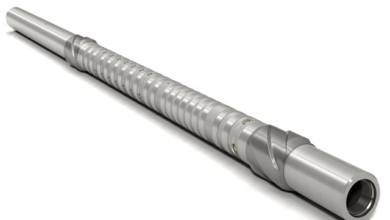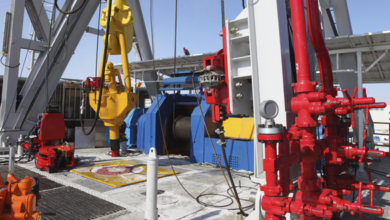Mark Denkowski: Passion for training reflected in expansion of IADC accreditation programs
By Joanne Liou, associate editor

After trekking two miles along a raised, wooden pathway in Papua New Guinea in 1978, Mark Denkowski found himself by the roots of mangrove swamps working on pumps supplying cooling water to the engines of tender rigs. Just 20 ft away, he saw his first, and perhaps last, aboriginal. Although he had never traveled much outside of the US before then, he kicked off his career in the oil and gas industry from Southeast Asia. It was his first hitch, and “it was an incredible eye opener” for a 23-year-old, he stated.
Mr Denkowski, VP of IADC’s Accreditation and Credentialing Division, grew up in King of Prussia, Penn., and graduated from Penn State University in 1977 with a degree in earth and mineral sciences. Without any personal ties to industry, his father proposed the idea of working in the oil and gas field since it offered a steady job and the opportunity to travel. “In the Northeast, especially back then, you didn’t even know about the oil and gas presence,” he said. “It wasn’t like growing up in Texas or Oklahoma or Louisiana where it’s all around you. It was new. It was foreign. It was a leap of faith.”
Mr Denkowski spent 15 years on tender rigs, primarily for Singapore-based Robray Drilling, working his way up from pump man to toolpusher and “thoroughly enjoyed every minute of it.” It didn’t take long for Mr Denkowski to become enraptured by his work in the field and the accompanying opportunities to travel worldwide. “It gets in your blood,” he said. “If you have the personality and an adventurous spirit about you, this industry gets a hold of you quickly.” His work took him across Southeast Asia, the Middle East and West Africa. Thereafter, he joined Santa Fe Drilling as a toolpusher on jackups before heading into the office in 1993 as an HR representative. “At the time, it was largest drilling contractor in the world,” he explained.
Mr Denkowski’s experience later expanded to Transocean, where he served as North American employment supervisor, and Frontier Drilling, where he was manager of training and development. He joined IADC as the managing director of accreditation in February 2011, bringing with him a passion for training that stems from his experiences in HR. “In HR, you work really closely with training. Especially at Transocean, we interacted with them constantly,” he noted. “It’s part of what you do in HR – ensure that people are trained. I saw the importance of training to the industry, to the company and to the people. If you don’t prepare people to do the job and give them the tools and knowledge, you’re not doing your job. It quickly becomes something you are either passionate about or not, and I quickly became very passionate about training.”
With his rig-based experiences coupled with HR and training knowledge, Mr Denkowski hopes to “give back to the industry as much as it has given to me.” He sees a significant increase in companies’ desire to help their employees become competent and to demonstrate that competence. “You can tell by the initiatives we have, such as restructuring well control training so that there is one world standard with one administrative body,” he said, referring to IADC’s launch of the Well Control Institute in August (see Page 18). “The energy in that is global.”
With the Workforce Attraction and Development Initiative (see Page 20), IADC has engaged community colleges from across the US, many of which have branch campuses around the world, from Indonesia to Malaysia to Qatar. “The idea is to standardize curriculum for new-hires, as well as build a trajectory of training opportunities for people throughout the industry.”
Mr Denkowski noted that the accreditation department will continue to tackle more initiatives that align with the strategic development of IADC: “The need for this association has never been as prevalent as it is now. The consistency that we offer through the accreditation process for training and for competence is growing. New accreditation opportunities are constantly emerging to serve an evolving industry.”
In September, IADC is launching helicopter underwater egress training (HUET) accreditation for the Gulf of Mexico; crane and rigging accreditation programs may also be developed. “The sky’s the limit as far as how much accreditation can or will grow over the coming years.”
In the two and a half years since Mr Denkowski joined IADC, the accreditation staff has essentially doubled. “We’re growing in proportion to the amount of activity that we have. As we add accreditation programs, we’ll need people to manage them properly.”
Industry’s challenges are manifested in its growth and especially in its demand for competent personnel. “(Given) the number of rigs that are under construction and the fact that we have a large amount of people who are and soon to be retiring, we need to replace that knowledge base and accelerate learning and training,” he noted.
He believes industry is stepping up to the plate through “unprecedented” efforts to ensure operational integrity. This can be seen through the number of people attending IADC conferences, such as the Well Control Conference of the Americas in August and the various HSE conferences held around the world. “Attending these conferences allows people to hear from the industry and to engage with other companies on new and innovative ways of doing things. Important collaborations are fostered at these events.”
When Mr Denkowski entered industry, he recalled, there was much more reluctance to share information, making it a challenge to learn from one another. Although industry has become more open and people have become more willing to mentor others, it’s important that employees take initiative to ask questions. “You still have to be inquisitive,” he said. “Knowledge is power, and being diligent about your job includes being diligent about learning your job.”



